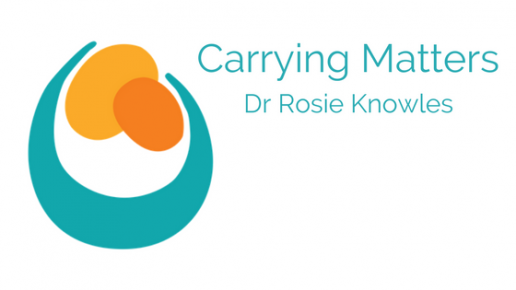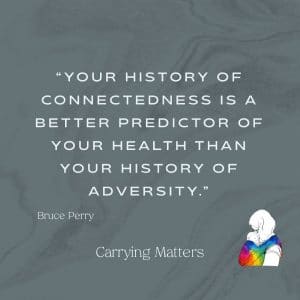“Your history of connectedness is a better predictor of your health than your history of adversity.”
It can be distressing, as the parent of a baby who had to be separated from you in the first few weeks of their life due to illness or frailty, or as the parent of a baby who cries a lot, to hear that the first few months are key to their future health and happiness.
I often get messages from concerned and deeply loving parents who hear messages about the impact of physical closeness and loving relationships in the early weeks, and begin to feel a failure, that they have let their child down or that their older child’s anxiety is somehow their fault.
Their experience of the first few weeks and months may be a situation that was completely out of their control (illness, a baby in the NICU), or because of the choices made based on the information given to them by their HCPs or their family/friends, or by the internet.
It’s worth remembering that “trauma” in the early months refers to neglect, the absence of emotionally attuned and responsive parenting, or harm. It is not referring to medical procedures/hospital stays, or the normal slightly uncertain start experienced by most families. All babies cry, to a greater or lesser extent, and this is not anyone’s “fault”.
So, if you’re feeling anxiety or guilt (that you shouldn’t!) please take heart from this fact from Bruce Perry, one of the leading authors of books and journals about childhood trauma and building resilience. He is very clear that it is the quality of positive and loving relationships around a child that matter most for their long term health: the “buffer” against any form of trauma or hardship or difficulty.
So your NICU baby or high needs baby or crying baby is benefiting every day from your love, that you are there, that you comfort them. Keep on!
Also, babies do not stop growing after the first few months: their brains are continuing to form connections and be shaped by their experiences. A loving, consistent relationship is protective and transformative. We learn about parenting as we go; we change our minds, we do things differently as we gain knowledge. And if we had to endure separation at the start, enjoying a loving and nurturing relationship now will be enormously beneficial.
We and our children are more than our trauma or the start we had in life; we are not defined by the bad stuff. Our assets and advantages are hugely important too.
For those of you who have adopted or fostered children from truly traumatic starts, how important your role is now, to offer them this connection and this stability.
It is always best to focus on what you can give your child now, rather than what you weren’t able to, whatever the reason.


